

|
|
Psychotherapy with Women at Midlife and Beyond by Katie Amatruda, PsyD, MFT & Lauren Cunningham, LCSW
|
Chapter 6
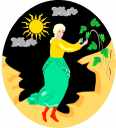
Creation
Once inner transformation has occurred, then the outer life begins to manifest the internal changes. We look at the three phases of creation:
Integrating the Witch's Power
The Arrival of the New Order: The Path Maker
Return of the Interior King

Integrating
the Witch's Power
| Sally decided not to take antidepressants. She confided shyly that she'd read on the web that they suppressed sexual interest and inhibited orgasms for some women. She didn't want to risk it. She remembered how she and Philip had had great sex when they traveled abroad and stayed in strange rooms. With Philip's encouragement she started planning weekends away. They left Friday night and brought hors d'oeuvres and wine to their room for dinner. After a picnic on the bed they became reacquainted as lovers. Sally felt more relaxed not worrying about her fertility; and she found a local vaginal hormone cream that made penetration fun again rather than painful. Philip prevailed on a doctor friend and got some Viagra, which made him feel like a young man. Much to Sally's amazement, he also procured some pot, which Sally had always loved for sex. Sally hadn't realized how inhibited she'd felt at home as she muffled her love from the children. Philip still worked hard but began planning for his retirement. Sally thought she could wait with their new found intimate connection. |
I was delighted and envious about Sally's rediscovered sexuality and her capacity to engage Philip. I admired her courage to "go for it." She and Philip were having a good time and had learned how to play sexually. She was a role model for me to follow my fantasies more. Sometimes my clients lead me forward by their courage and example. I amazed my husband one evening with a smoldering offer to massage him - our old code for SEX.
The article Sally found on the
Internet was 'Depression & Sex: Lifting Former Can Depress Latter' at
http://healthwatch.medscape.com/cx/viewarticle/217820.
It states that "One study published in the Psychopharmacology Bulletin
showed that under direct questioning, 60% of patients taking SSRIs admitted
having some form of sexual dysfunction or dissatisfaction. The most common
gripes:

As the first stages of transforming from witch to queen are mostly internal (crying, getting lost, introverting to the sacred cavern and finding the animals), the next phases are bringing those changes out into the world. As the 'dark night of the soul' ends, the sun rises onto a new consciousness. For some women, a new sense of power is born.
In alchemical terms
this stage of the process is called "coagulatio." It belongs to the symbolism
of earth: when liquid cools it turns into a solid. The personality consolidates
and takes form, the ego is strengthened so more risks can be taken like Sally's
sexual exploration. On the down side, this can stimulate guilt because
psychologically embodiment is often equated with evil. I was aware that
as Sally rediscovered her sexuality she was at risk of having her old inhibitions
resurface. But she seemed to navigate those well. Coagulatio or manifestation
in the world is promoted by action. Taking action helps to solidify our personality.
The archetypal images become incarnated in concrete, personal forms such as
through the relationship with the therapist. The emergence of intense transference
desires may indicate a beginning Coagulatio process. Desire promotes Coagulatio.
Some people are not very invested in life. They don’t know what they want
and are afraid of their desires. E. Edinger commented that coagulatio is promoted
by an active, responsive, participating approach by the therapist.
| The
psychiatrist who referred Weslia called her "shell shocked". She originally
came in for therapy suffering from postpartum depression subsequent
to the birth of her daughter Emily. With four years of therapy
and antidepressants some of her depression had lifted. Her voice often
sounded flat until she realized how unappreciated and overworked she
felt. She started connecting this to how she had felt as a child.
She realized that, along with green eyes, the legacy she had received from her mother was the postpartum depression. Weslia had unconsciously blamed herself for her mother not loving her enough when she was young. Putting together the pieces, much like a detective, she realized that her mother had a serious postpartum depression when Weslia was born. She traced this back several generations and discovered through old journals that her great grandmother, Great, also had suffered from depression, as had Great's mother. "I will talk to Emily when she is older. I never want another child in my family to blame herself for her mother's depression. I didn't know and I suffered. I can forgive Great for her meanness. If she felt what I had felt, that she was unlovable because of her mother's depression, it would be awful. We're strong women, if you ask me." Weslia's awareness allowed angry tears to come. Finally she did what she had always wanted to: She took drama classes and got a role in community theater. She was enormously pleased when she had to go late to Sue's annual company barbecue because she was auditioning for the lead in a play. "There she was, with the two children, and I sailed in late." |
I recognized that my envious feelings of Weslia acting on her dreams were a parallel process to Weslia's earlier envy of Sue's life in the world. Through a projective identification process Weslia helped me understand her dilemma from the inside out. But I also had to look at my own unlived ambition and competition when Weslia had resolved to try out for a play. I had discovered the countertransference pitfalls of living life vicariously through my clients. Now I used my feelings of envy to become more conscious of what was missing in my life as well as to experience my clients' pain.
Jung has stated that at midlife, the unlived life wants to be lived. He states that a midlife passage often involves a rebalancing. Someone who had lived by their thinking function, for example, would be pulled to develop their feeling function. Extraverts begin to go inside, and introverts find themselves wanting to be more in the world.
In the essay 'Soul and Death' Jung writes, "from midlife onwards, only he remains alive who is willing to die with life. What happens in the secret hour of life's afternoon is the reversal of the parable, the birth of death....Becoming and passing is the same curve..." (CW, Vol. VIII, 447)
For me, having lived most of my life as an extraverted feeling type, my jealousy toward Weslia was not about her acting. I knew I could do that; there was no opposite there for me. My craving was for time alone, to write. This is an introverted, thinking function that is new for me. The envy made it clear that my 'unlived life' wanted to be lived, and I needed to create time and space for myself to make this happen.
From The Typology of Carl Gustav Jung or the psyche based on two polarities
by Kees RazenbergThe core of Jung's typology
Basically, Jung's typology is simple. Jung bases his typology on four
functions of consciousness, namely: feeling, thinking, intuition and
sensation.
Feeling and thinking form a polarity, just as intuition and sensation do.
According to Jung, people are equal to the extent that every person
possesses these four basic functions. Differences between individuals are
based on the fact that the influence of each basic type is of a different
strength within each person.
From this reasoning, Jung comes to the following four basic types of
persons:
1. the feeling type
2. the thinking or rational type
3. the intuitive or contemplative type
4. the sensational or pragmatic type
Every person can be classified according to one of these four basic types.
The person's basic type determines the typical way of experiencing and
valuating reality. Before going further into the theoretical aspects of the
basic functions and relations between them, the types are briefly described
in terms of behaviour, which for example can be observed during a
meeting. This way a quick understanding of the four basic types, the
foundations of Jung's typology, is obtained.
The feeling type focuses himself particularly on the feelings that exist
between people. He attaches importance to fine relations between the
members of the assembly. It is the type that wants to keep people together.
Results are of less importance.
The rational type focuses himself particularly on substantial research
results. He is the type that wants to have a firm, objective and analytic
research to be done before he decides anything.
The intuitive or contemplative type wants to see the subject of the meeting
in a larger, more inclusive and strategic context. This type hates rash
action, and is as such opposite to the next type.
The sensational or pragmatic type wants to actually put something into
effect, and do it as fast as possible. In the end there will be time enough for
things to be reflected....The relation with Jung’s notions ’Individuation’ and ’Self’
Jung has written an entire book on the notion 'Self', which takes an
important place in his thinking. According to Jung, the Self is "the objective
whole, the antithesis of the subjective ego psyche or the archetype that
underlies ego- consciousness" [Jung 1979, p.222]. The ego, following this
description, is subordinate to the Self. In his book on "the concept of the
Self", Jung indicates what important symbolisms from ancient (alchemist)
documents, belong to the Self.
Important symbolisms of the Self are the circle, the quaternity and the
cross. In Jung's words: "the circle and quaternity symbolism appears as a
principe of order, which depicts the union of warring opposites" [Jung 1979,
p.195]. It is rather obvious when reading 'quaternity' and 'warring opposites'
to think of the distinction between the four basic functions of Jung's
typology. When these basic functions are seen as the elements of the Self,
this notion gains more significance.
From the idea that the four basic functions of consciousness are the
elements of the Self, one can define the Self as the state in which the four
basic elements or functions of consciousness form a unity or are in
balance. The ego is then the state in which there is an imbalance between
the functions in a person, in the sense that certain functions dominate at
the cost of other functions. In the model of the basic functions, one could
place the ego and the Self on the intersection between the basic functions.
This way the ego and the Self form the fifth element on which everything
turns (the quintessence)
.
One could say that every human being starts his life from the
Self-consciousness, and then returns via the situation of the
ego-consciousness to the situation of the Self-consciousness, but on a
higher (more conscious) level (it is possible to think of 'returning to being a
child' here, but in a more aware way). Translated to the model of basic
functions, this means that initially these functions are evenly balanced in a
human being, but at the start of the ego-consciousness (approximately the
first year of life), an imbalance occurs within that person, which eventually
has to be solved. The human being has to return to oneness or
individuation.
Jung claims that this process takes place at the age of about fourty. As a
rule, people of that age have strongly developed their characteristic
function, but that doesn't complete the case. At that time, a person feels
that he is missing something or has neglected certain important matters. In
the case of a rational type it is mainly the feeling function that has been
underdeveloped; in the case of the intuitive type it is the sensational
function. This underdeveloped function can also be described by Jung's
notion 'a persons's shadow'. The integration of a person's shadow can be a
difficult process. The so-called 'midlife' crisis can probably be reduced to
this, next to other legitimate explanations.
The more the polar functions have been separated (dissociated), the more
difficult this integration is. For example, the intuitive type can be alienated
from the concrete physical reality in such a way, that it loses every contact
with reality and gets stuck in a sort of ideal or fantasy world
(schizophrenia). The opposite holds for the sensational type. This type runs
the risk of being absorbed by all kinds of sensational stimuli in such a way
that it loses every contact with the deeper spiritual layer in itself. What is
important when integrating an underdeveloped function, is to find a new
centre in oneself that is broader than the ego, and from where tensions in
the ego can be transcended. One can call this the Self, or, in Jung's words:
"the archetype that underlies ego-consciousness".
It can be said of this Self-consciousness that humanity as a whole is
growing towards it with difficulty, just like the time when humanity grew
towards the ego-consciousness. And like every child that reaches by itself
the ego-consciousness, every human being could perhaps in the future
reach Self- consciousness by itself. Our starting point is then that the
ego-consciousness and the Self-consciousness are phases in the
consciousness-evolution of mankind, and that every human being is
walking through this evolution in fast motion (the so called recapitulation
theory in developmental psychology).Please see the complete article at:
http://www.cgjungpage.org/articles/razenberg.html
There
is a site directed at teachers, which describes learning styles in terms of
typology, at
http://www.bergen.org/ETTC/courses/LearningStyles/MBTI.html
A woman needs to come to terms with her responsibility for her life and the mistakes she has made. She needs to recognize the gifts she has received in the painful, burning process she has undergone, in the tears and loneliness in the sacred cavern. Symbolically, this is eating the whole apple, the poison and the pure parts, integrating and incorporating both. The split is ameliorated by staying conscious of the tension between the opposite parts of herself long enough until something new can arrive. She becomes ready to:
This opens the way to truly living in the present.
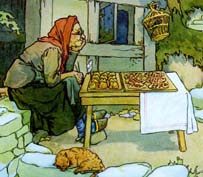
| Cynthia
called for a session. I was stunned; it had been over a year since I had
reported Kurt's abuse to the department of social services, and she had
quit therapy. We met and I felt wary, having received quite a tongue
lashing at out last meeting. She looked great.
"Well" she started, "I am not here to thank you, but I suppose I could. When you reported Kurt, that got me into the system. The social worker was great. She arranged for me to get into an assisted living situation that I could afford. And she made me go to a battered women's group. I realized when I was there that I had been battered my whole life—as a child, by my father and mother, as a wife, and then as a mother. I will never again allow someone I love to abuse me." "I have been going to concerts. You must remember my earlier love for music; well, I can't play the piano anymore with the arthritis. But the place where I am living takes us to concerts. I don't have to worry about parking or walking back alone to the car or a bus stop. It's wonderful to listen to live music again." "I am not coming back to work with you because I don't feel that you can help me. I want to live as fully as I can with all the pain and disability I have from my arthritis. And I'm thinking about dying someday. I'm going to the Unitarian church near my home. I grew up a Presbyterian and used to believe in God when I was a little girl. I stopped believing when I was a teenager and quit church. I feel differently now." She didn't meet my eyes. "Maybe all this therapy business helped a little." She paused. "Anyway now I want to connect to a congregation. I'm praying again." She went on: "Kurt also had to go for treatment after he got probation. I never see him or hear from him, but that means he has stopped asking for money. My oldest son Aaron and Patricia and my grandchildren came out to visit this past month. It was a good time. They are good kids." |
I was pleased that Cynthia came back to tell me about herself. I heard her acknowledgment of our work. I was struck by how powerful she had become and felt honored to have been with her for part of her journey. I wondered if there was anything I could have done differently in our work together that would have enabled her to stay in therapy. Cynthia felt betrayed when I reported her son's abuse. I still think about our work with regret, and wonder if it reflected my negative countertransference to her at the beginning of our work. I wish she had been able to stay with me. I am grateful to the social worker who helped her find housing and for getting her into a group so that she could finally address the issues of being a battered child, wife, and mother. Her connection to a spiritual community felt right.
The
Witch learned a lot from Grandmother Bear, and perhaps Grandmother Bear
learned things from the Witch. Then Grandmother Bear did the thing bears
do, she provided the 'ethical mother initiation' for the Witch. One
day, she sent the Witch out to forage for food, and the Witch returned to
the cave. Yet instead of the entrance being blocked so that she could
not get out, the entrance was sealed so that the Witch could not get in.
This is what mother bears do to their cubs. For the Witch, the dilemma
was the same as for any bear cub, instinct or obedience?
The
Witch stood outside the cave entrance and began to wail. It is to her
credit (and Grandmother Bear's) that she bypassed the tantrums of earlier
times. Finally, she realized that the door would not open, and that
she was on her own.
Her wailing turned to true tears when she remembered how
she has thrust Snow White out into the world on her own, when Snow White was
only a young girl. The Witch felt true remorse, and began to examine her life,
with truth and integrity. It was as if the mirror now reflected her soul,
and did it honestly, allowing no excuses.
The Witch began to acknowledge the pain that she had caused,
and began to understand that it originated from her own pain. She slowly
began the long journey of forgiveness; forgiving herself as well as though
who had hurt her.
Mirror mirror on the wall
Please help us truthfully recall!
The Arrival of a New Order: The Path Maker

| Josephine
was reminiscing about when started to write her memoirs. "It was rather
terrifying at first. I had to go back and dig up all the graves
in my being. Not only the life events that I had forgotten, but parts
of myself that I had lost long ago. I had forgotten how I used
to sing in church as a child. The pastor said that when I sang he thought
an angel had appeared in the congregation."
"Then I remembered the war when my fiancé was killed. I thought my broken heart would never recover. The war years came back to me, and the racism that I have experienced in my lifetime. Hope surged through my being when I heard Martin Luther King speak. I grieved his death along with the Kennedy's. I have witnessed almost a century." "Once I started to write, there was no turning back. I wrote about the horror and the beauty. But my voice is no longer heavenly. No one reading my memoirs would mistake me for an angel." |
The
road she is on is the only road there is. Turning back is not possible; whatever
bridges have not been burnt have been swept away by floods. What she has learned
from her experience of the witch can now guide and protect her on her journey
that she must follow.
| Gabriela
came to the session very pale. "My dream, I am afraid it was about
Peter. He had chest pains a few nights ago, and I made him go
to the emergency room. They think he had a mild heart attack.
Did I tell you his father died of a heart attack when he was 56?
Peter is 50 now. I'm so scared! I don't want him to die."
Gaby rallied. Peter's heart attack was mild, and he took it as a warning. As he faced his mortality Peter realized that his priorities needed shifting. He quit his writing group without an explanation. Aware now that he might not be around forever, he took a firmer hand with his daughter Angelique, setting limits around her time with her boyfriend Jack as well as how she treated Gabriela and him. Gabriela experienced her deep love for Peter. "It is terrible that you have to feel close to losing someone before you appreciate them." Talk of Gabriela's mother coming to live with them went on hold. "I lie next to Peter and actually feel aroused. I thought that was over for me. I've fallen in love with Peter again." Here she got a twinkle in her eye, "And we pretend that sex is forbidden, which of course it is not. We see how long we can resist each other's caresses and entreaties and that is very erotic to me! Almost like being teenagers again." |

Having been lost a woman may now find her way. Some obstacles can be overcome and she can gain a new clarity and confidence. Her choices may alarm her friends and family ("You're doing WHAT? Moving WHERE?") but she is not dissuaded. Engagement and focus seem to fill her being. Old concerns fall away from her while her newfound fierceness has given her an ability to discern the path for herself. She becomes fruitful and creative on her own behalf.

| Suzanna
approached the sandtray with delight. At 72, she had worked hard raising
her children and was enjoying her retirement. She sculpted the sand
and put in miniature figures. "This is Ira, my husband" she said, placing
in a bare chested man. "He looks good. Even though he has been
gone for nearly 15 years, I feel him with me." Then she placed a variety
of women in the box of sand, commenting about each one. "This is my
bird watching, this is me playing tennis, here I am in the garden. This
is when I visit Violet (an elderly neighbor), this is my love of opera.
Here I am at Temple." Suzanna’s list went on for she had many interests.
She clearly enjoyed doing the sandtray and seemed to feel gratified
by how full her life was.
At the end she looked down at what she had made. "Oh my! I have forgotten the children!" |
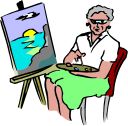
She started off through the woods. She didn't know where she was going, but she knew she was heading in the right direction. She had learned as a Witch to trust her head (for she was very very smart) and in her time with Grandmother Bear she had learned about trusting her heart. Now, with instinct triumphing, she knew she could trust her gut as well.
The rock helped her in that. Rocks are very ancient, as are our instincts. She was following the wisdom of every ancestor, back to the first woman and the first man, the knowledge that lives in the belly. Heading off, she knew not where she was going, only that she was heading in the right direction.
Listening with her head and heart and belly, the forest became alive to her. Each sense was energized. The smells of the trees, the pine needles underfoot, became stronger. She could smell animals before she could see them, avoiding the dangerous animals and able to approach the safe ones without a sound. Each taste became more acute; each nut and each berry was savored, not gulped. Her ears were attuned to every sound, not only animals and birds, but each leaf as it fell. She truly 'saw'; it was as if before she had been blind and now each color thrilled her. She saw the light and the shadows as if for the first time. Her skin became sensitized to the kiss of the wind, the caress of the raindrop, the warmth of the sunlight on her skin. Trusting head, heart and belly, each night she found a safe and warm place for sleep. And before each night she closed her eyes, she remembered the 'sense' of each day, marveling at a taste, a smell, a sound, a sight and a feeling that she had. And she was grateful.
Following head, heart and belly, she knew which way to go. If any of the triad flashed a warning, or told her 'no', then she stopped. She took the forks on the path which felt right to all three, head, heart and belly.
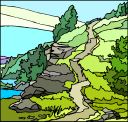
Return of the Interior King

| Suzanna
decorated her new home with halogen lamps and white wicker furniture
that she could easily move around. She sewed floral chintz curtains.
She had designed her cottage for herself and paid for it with the sale
of her home where she and Ira had raised their children.
"I only have things here that I love. My canisters are from Italy, my plates are Japanese pottery. I only keep out a few cups; I no longer a need matching service for 16. I gave my good china to the children when I moved. I love using my silver for everyday." "I want to see beauty wherever I look. Beauty and simplicity. Ira had the taste of someone from the Old World—heavy furniture, dark wood. I like light!" Suzanna was auditing a class on the Kabbalah, and was particularly taken with the concept of 'tikkun olam'. She sent me to a web site: "The true self within something is referred to in Kabbalah as a holy spark, and the Zohar tells us that nothing can exist without having a spark of holiness at its core. The process of removing barriers to release these sparks is known as tikkun, correction or repairing. To repair the world at large through good works is tikkun olam, and to repair one's individual soul is tikkun nefesh. " (source: http://web.wt.net/~cbenton/kabbalah/klippot.htm) It was the children who had most resisted Suzanna's plans to sell the old house. When her daughter Jane visited the new cottage eight months later, Suzanna boasted, "Nothing in this house comes from before, only the Mezuzah." Jane commented on the family photos still stored in boxes in the bedroom closet. Suzanna noticed that Jane had absentmindedly touched the mezuzah on the door post when she entered her new cottage. Previously Jane had identified more with being an 'American' than a Jew. But one day Jane mentioned that she had talked to her husband about going to a reform temple. She said that she remembered the reverence with which Suzanna and Ira had touched the mezuzah as a daily reminder of the presence of divinity in the house. |

Suzanna
is taking charge of her life, her finances, her health. A new spaciousness
opens up in her home and in her psyche. She declutters with a vengeance learned
only from the witch. Out go the children's report cards, the faded potpourri,
the friends that take more than they give. Inner structure and strength appear,
yet she remained related to herself. There is no danger here of becoming the
Snow Queen with her frozen heart, because she is following her heart.
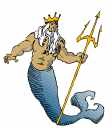
When the 'king' returns, a woman learns how to:
| Louise's
life took a surprising turn after meeting Nina in the park. Nina
and Glen asked if Freddy could spend more time with them and their daughters.
Soon meetings at the park and playground mushroomed to overnights and
weekend visits.
At first Louise was afraid to give up control. But Freddy played happily with his little half aunts. (It did took a while to figure out what to call the familial relationship between Glen's young daughters and their half brother's son.) Nina had patience and energy for all three children. Louise finally had to admit that she felt renewed and more relaxed with some time off from Freddy. Glen not only made amends to Louise, but he acknowledged that his alcoholism had caused him to neglect their son, Freddy's father. He discovered that he wanted a relationship with his grandson. Louise found herself reading the business section of the newspaper. This surprised her, because even as an administrative assistant in a nonprofit agency, she had had little interest in her own money. Now she bought books on investing and began to question how her pension was being invested. A new order arose in Louise's finances. She joined a group of amateur investors, and was surprised when a man named George asked her out. "I won't call it a date," she laughed, "because I don't want to think about dating at my age. But we did go out and had a nice time. I'm not looking for love anyway, just company." Then she started to laugh. "You will be so proud of me! I went and had my first pedicure ever. It was such a treat to have my feet soaked and massaged. And the chairs are like thrones!" |
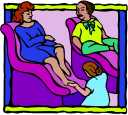
|
Josephine told us about the life changing moment when she heard Martin Luther King, Jr. speak. "He electrified me...I still get tears in my eyes when I think about him saying, 'I look to a day when people will not be judged by the color of their skin, but by the content of their character.' I had so often been judged by my appearance, my skin. As a woman of color, who was educated, I had taken racism for granted. Dr. King let me know there could be a different way. That was when I started speaking up to the Board of Education, and it lead to me becoming a principal. On August 28, 1963 at the March on Washington for Jobs and Freedom on the steps of the Lincoln Memorial, Dr. King gave me the courage to follow my dream. His speech 'I Have a Dream' changed my life. I found my voice, for the soul that had been silent for generations." There is
a download of parts of this speech at seattletimes.com:
|
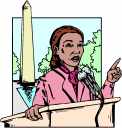
The Witch's path lead her to a road, She knew
she had to follow it, but it was dread she felt as she began to recognize
it. She gasped when she walked by a little cottage, remembering that
this was the place Snow White lived with the dwarves. She wanted to sneak
by, but the triad within her (head, heart and gut) insisted she stop.
All was silent, then she heard some whistling. Out came the dwarf who
couldn't speak, the youngest of the seven brothers.
She nodded to the silent dwarf, who looked very frightened; he was too paralyzed to even run. The Witch felt badly that her mere presence could cause so much fear. She remembered her own fear of Grandmother Bear, so she spoke to him, in a soft voice. She could see he was sick, that is why he was not off in the mines with his brothers.
She carefully prepared some herbs to heal him, but he recalled the poison apple, so he recoiled from the herbs. The Witch despaired. Here she was finally trying to do the right thing, and use her powers for healing, but the dwarf did not trust her. She sat down and started to cry. With her first tear, the little man took a step toward her. He touched her tear, and began to trust her a bit. As she apologized to him he took a sip of the potion she had prepared, and he began to feel better.
The Witch stayed a long time with him and his brothers, dispensing healing herbs. Her hair grew white and wild, she was now a crone, a wise woman of the woods.
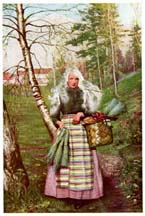
888-777-3773